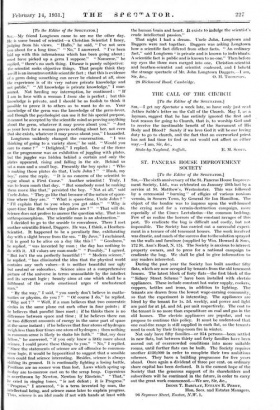ST. PANCRAS HOUSE IMPROVEMENT SOCIETY
[To the Editor of the SPECTATOR.]
Sra,—The sixth anniversary of the St. Pancras House Improve- ment Society, Ltd., was celebrated on January 29th last by a service at St. Matthew's, Westminster. This was followed by a ceremonial " burning " of effigies of various noxious vermin, in Somers Town, by General Sir Ian Hamilton. The object of the bonfire was to impress upon the well-housed the crying need for a vermin-destruction campaign, more especially of the Cimex Lectularius—the common bed-bug. Few of us realize the horrors of the constant ravages of this pest. To eradicate the biig is difficult and costly, but not impossible. The Society has carried out a successful experi- ment in a terrace of old tenement houses. The work involved was drastic, and much of the success due to the solution sprayed on the walls and furniture (supplied by Wm. Howard & Sons, 172 St. Ann's Road, N. 15). The Society is anxious to interest property owners, and to press for a national campaign to eradicate the bug. We shall be glad to give information to any readers interested.
During the past year the Society has built another fifty flats, which are now occupied by tenants from the old tenement houses. The latest block of forty fiats—the first block of the " Sidney Street Scheme " have been installed with electric appliances. These include constant hot water supply, cookers, coppers, kettles and irons, in addition to lighting. The tenants are drawn from the lowest wage-earning community, so that the experiment is interesting. The appliances are hired by the tenant for is. 5d. weekly, and power and light are paid for at and 5d. per unit respectively. The cost to the tenant is no more than expenditure on coal and gas in the old houses. The electric appliances are popular, and we propose to continue this policy. It must be understood that one coal-fire range is still supplied in each flat, as the tenants need to cook by their living-room fire in winter.
Not only have fifty families—or 254 persons—been settled in new flats, but between thirty and forty families have been moved out of overcrowded conditions into more suitable rooms, until further flats can be built. The Society requires another £130,000 in order to complete their two ambitious schemes. They have a building programme for five years ahead. Once again a dividend of three per cent. on ordinary share capital has been declared. It is the earnest hope of the Society that the generous support of its shareholders and subscribers will be continued in the future, in order to carry out the great work commenced.--We are, Sir, &c.,















































 Previous page
Previous page